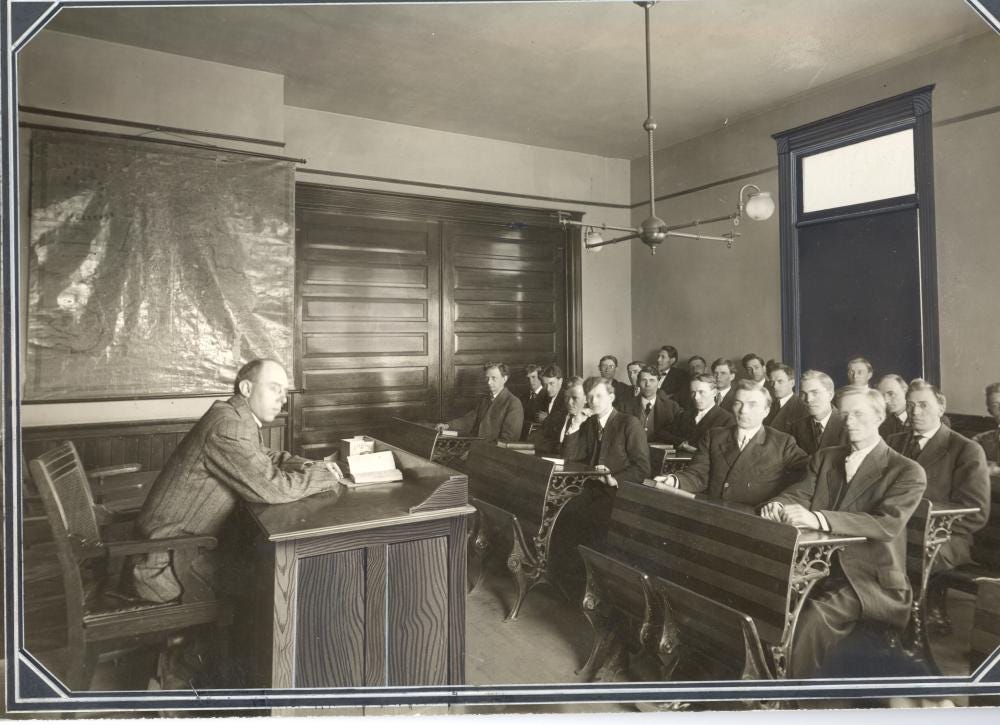Would Paul Send Elders-to-be to Seminary?


How should a church select its elders? Should those men, particularly teaching elders, go away for several years to seminary before assuming the task of shepherding? Ronald Allen, Anglican missionary to China from 1895-1903, sheds light on such questions in his seminal work, Missionary Methods: St. Paul’s or Ours? He begins by pointing out that those elders we see in the New Testament were selected primarily based upon their moral character, not their intellectual competency. Says Allen:
“They were not necessarily highly educated men, they cannot have had any profound knowledge of Christian doctrine. It is impossible that St. Paul can have required from them any knowledge of Hebrew, or of any foreign language… It is not probable that he expected or demanded any profound knowledge of Greek philosophy. It is inevitable that he must have been satisfied with a somewhat limited general education, and with a more or less meager acquaintance with the Septuagint and with his mystical interpretation of it, with a knowledge of the brief outline of Christian doctrine set forth in the Epistle to the Thessalonians, and some instruction in the meaning and method of administration of the two sacraments of baptism and the Lord’s Supper.
The qualifications of elder were primarily moral. If they added to moral qualifications intellectual qualifications so much the better, but high intellectual qualifications were not deemed necessary. Very early there grew up a class of teachers who by virtue of their spiritual insight into the meaning of the Old Testament, or the sayings of Christ known to them, occupied a place of great importance in the Church; but they were not necessarily elders. This is the state of affairs depicted in the Didaché, and the Didascalia agrees with this. ‘If it be possible let him (the bishop) be a teacher, or if he be illiterate, let him be persuasive and wise of speech: let him be advanced in years.'”
In our day, laments Allen, “The examination test is made the real test of fitness for the priesthood. Moral qualifications may suffice for the office of catechist, but if a man is to proceed further he must pass an examination of a very artificial character. In other words, we select by examination.”
He goes on to name four (I’ll only list three) “very serious consequences” of such a selection process, each of which is being experienced in spades in our day and land:
“(1) The young men so educated are sometimes, by that very education, out of touch with their congregations. They return to their people with strange ideas and strange habits. They are lonely, and they have to struggle against the perils of loneliness. They are not even the best teachers of people from whose intellectual and spiritual life they have so long been absent. They do not know how to answer their difficulties or to supply their necessities. They know so much Christian doctrine and philosophy that they have forgotten the religion of their country. The congregation has not grown with them, nor they with the congregation. They come, as it were, from outside, and only a few exceptional men can learn to overcome that difficulty.
(2) The grave men of the church, the natural leaders of the village life, and the natural leaders of the church are silenced. The church is not led and administered by the people to whom all would naturally turn, but either by a foreigner, or by a young man who has come with a foreign education. In this way a great source of strength is lost. The real elders of the community are not elders in the church, and the whole church suffers in consequence.
(3) The natural teacher, the divinely gifted preacher, is silenced. The only teacher is the foreign-educated minister. There is no opportunity for the church to find its prophets, nor for the prophets to find themselves. The prophet is in danger either of losing his gift or of leaving the church in order to find opportunity for its exercise.”
For the record, I’m the very thankful beneficiary of a wonderful theological education. In fact, irony of ironies, I first read Allen’s work while in the hallowed halls of the seminary I attended. One could certainly overcorrect and throw the baby out with the bath water. Still, it seems to me the current model of selecting and training clergy needs to be reconsidered along biblical lines. While the current schema of pastoral training has produced much good fruit, it’s no doubt aided and abetted the modern tendency to make the “examination test” the exclusive qualifier for ministry at the expense of the “moral tests” which clearly seem to be of utmost importance to St. Paul (Titus 1:5-9, 1 Tim. 3:1-7).
The post Would Paul Send Elders-to-be to Seminary? appeared first on Kuyperian Commentary.

